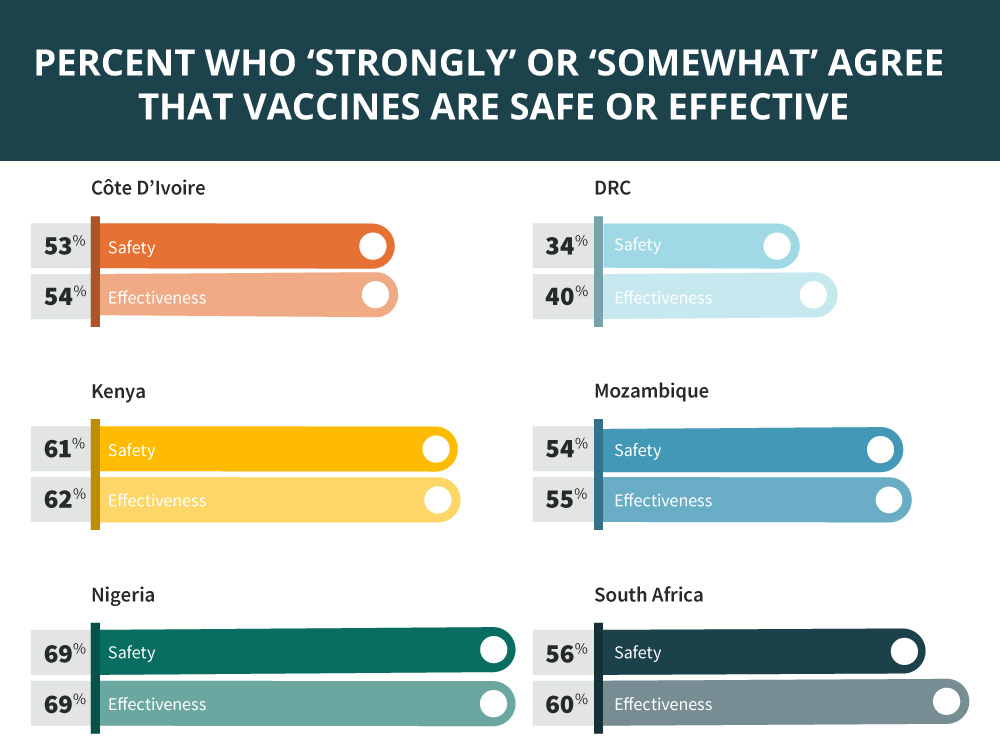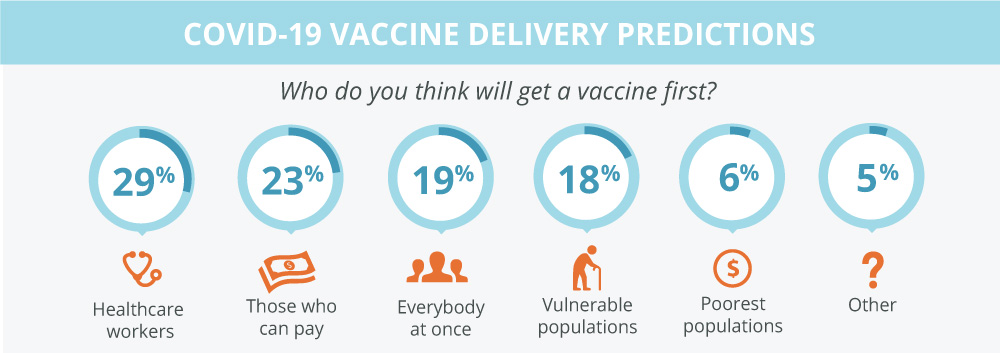As COVID-19 vaccines begin to be distributed, attention is now turning to vaccine production and distribution. With a limited supply available, countries are acquiring vaccine doses for their citizens and deciding how to prioritize distribution among various at-risk groups. Given the costs associated with purchasing vaccines, there is already concern that less wealthy nations such as those in Africa will be further behind in the race to vaccine their populations: A report from the People’s Vaccine Alliance found that wealthier countries have horded so much vaccine supply that as many as 90% of populations in low- and middle-income will not receive a vaccine in 2021, even as countries such as Kenya experience a second wave of cases.
There is also a question of how many people will be willing to get a vaccine right away; experts have said that around 80% to 90% of the population must have immunity to COVID-19 in order to reach ‘herd immunity’, but in countries such as the United States only about 60% are willing to take the vaccine right away. In Africa, where vaccine access has improved greatly in the past thirty years, the spread of false information and conspiracy theories has led to an increase in vaccine hesitancy, threatening to undo the progress that has been made.
With widespread vaccination a crucial factor in eradicating COVID-19, GeoPoll’s most recent study included several questions on vaccine hesitancy and the likelihood of populations to get a COVID-19 vaccine. The study was conducted in November, immediately following the news of Pfizer’s vaccine being at least 90% effective. Questions were administered by SMS to a nationally representative sample in Côte D’Ivoire, the Democratic Republic of Congo, Kenya, Mozambique, Nigeria, and the Democratic Republic of Congo. Download the full report below or view the interactive dashboard of results here.
Vaccine Hesitancy in sub-Saharan Africa
 In order to assess vaccine hesitancy, GeoPoll asked about vaccine safety and effectiveness and found that in terms of vaccine safety, a third of respondents ‘strongly agree’ that vaccines are safe, while an additional 21% ‘somewhat agree’ and 29% ‘neither agree or disagree’. Confidence in vaccine safety is highest in Nigeria and South Africa, where 41% and 35% respectively strongly agree that vaccines are safe. Those in the DRC were the most likely to report that they strongly disagree that vaccines are safe, at 23% of respondents. There were no large differences observed by age and gender.
In order to assess vaccine hesitancy, GeoPoll asked about vaccine safety and effectiveness and found that in terms of vaccine safety, a third of respondents ‘strongly agree’ that vaccines are safe, while an additional 21% ‘somewhat agree’ and 29% ‘neither agree or disagree’. Confidence in vaccine safety is highest in Nigeria and South Africa, where 41% and 35% respectively strongly agree that vaccines are safe. Those in the DRC were the most likely to report that they strongly disagree that vaccines are safe, at 23% of respondents. There were no large differences observed by age and gender.
Examining vaccine effectiveness, we find similar results, with a third reporting they ‘strongly agree’ vaccines are effective and 24% somewhat agreeing with the same statement. Again those in Nigeria were most likely to strongly agree with vaccine effectiveness, at 40%, while those in DRC were most likely to strongly disagree. Overall slightly more respondents either strongly or somewhat agree that vaccines are effective than they agreed with vaccines being safe.
Comparing this question to findings around trust in government information, we found that those who were less confident regarding their government’s information also reported lower levels of agreement with vaccine safety. Of those who strongly disagreed that their government was providing truthful information, 30% strongly agree that vaccines are safe, while 37% who strongly agreed that their governments information is truthful say the same regarding vaccine safety.
COVID-19 Vaccine Acceptance in South Africa, Kenya and more
 GeoPoll also asked ‘If a COVID-19 vaccine was available for free today, would you get it as soon as possible?’ and found that in total 42% stated they would ‘definitely’ get it as soon as possible, while ‘20%’ stated ‘probably’. This question showed interesting trends by country, with those in Kenya, Mozambique, Nigeria, and South Africa reporting relatively high levels of likelihood to take a COVID-19 vaccine, while those in DRC and Côte D’Ivoire are less likely to take a COVID-19 vaccine as soon as possible. Although the youngest age group, those aged 15-24, reported slightly lower levels of enthusiasm regarding taking a COVID-19 vaccine than older age groups, the differences were quite small, with 59% of the youngest group and 62% of the oldest group reporting they would ‘definitely’ or ‘probably’ take a vaccine as soon as it was available.
GeoPoll also asked ‘If a COVID-19 vaccine was available for free today, would you get it as soon as possible?’ and found that in total 42% stated they would ‘definitely’ get it as soon as possible, while ‘20%’ stated ‘probably’. This question showed interesting trends by country, with those in Kenya, Mozambique, Nigeria, and South Africa reporting relatively high levels of likelihood to take a COVID-19 vaccine, while those in DRC and Côte D’Ivoire are less likely to take a COVID-19 vaccine as soon as possible. Although the youngest age group, those aged 15-24, reported slightly lower levels of enthusiasm regarding taking a COVID-19 vaccine than older age groups, the differences were quite small, with 59% of the youngest group and 62% of the oldest group reporting they would ‘definitely’ or ‘probably’ take a vaccine as soon as it was available.
When asked what concerns respondents most about a COVID-19 vaccine, vaccine safety was listed first, at 35%, followed by the ability for everyone to get the vaccine at 27%. Interestingly even in countries which had higher levels of agreement with vaccines being safe in general, such as Kenya, vaccine safety is the top concern when asking specifically about the COVID-19 vaccine. The youngest age group was most likely to be concerned over safety of the COVID-19 vaccine, with 37% of those aged 15-24 listing vaccine safety as their top concern.
Similarly to the findings regarding overall vaccine safety and effectiveness, likelihood to take a vaccine is impacted by trust in government information. Of those who either strongly or somewhat disagreed that their government was providing truthful information, 34% would definitely take a vaccine right away, while of those who agreed with their government’s information, 47% would definitely take a vaccine as soon as it’s available.
COVID-19 Vaccine Availability and Delivery
GeoPoll also examined when populations believe a vaccine will be available to the public, finding that the largest group, 39%, reported being unsure, while 31% believe a vaccine will be available between January and June 2020, and only 5% believe that a vaccine will not be available until 2022. Those in South Africa believe a vaccine will be available to the public the earliest, with 39% in South Africa believing that a vaccine will be available between January and June 2020, while respondents in the DRC are least sure about when a vaccine will be widely available.
Vaccine distribution is being heavily discussed as vaccines go into production, with most reports stating that healthcare workers and elderly or vulnerable populations will be the first to receive a vaccine. GeoPoll’s study found that, while 29% believe healthcare workers will receive a vaccine first, 23% believe that ‘those who can pay’ will get it first. Results for this question were also quite different by country; in the DRC and Côte D’Ivoire, the largest groups of respondents believe that everybody will get access to a vaccine at once, while those in Kenya, Mozambique and Nigeria believe healthcare workers will get first access, and in South Africa the highest percent, 31%, think a vaccine will go to those who can pay. By gender, we find that males are slightly more likely than females to believe a vaccine will go first to those who can pay.

Conduct Research on Vaccines with GeoPoll
These findings, along with the findings on income decrease and mental health outlined in our full report, demonstrate that those who are being hit the hardest by COVID-19 impacts are most willing to take a vaccine as soon as it is available. In the coming months, more research is needed on vaccine hesitancy along with perceptions of the COVID-19 vaccine as it begins to be distributed. GeoPoll conducts surveys globally through multiple mobile-based methods, including Computer Assisted Telephone Interviewing and SMS. To request more information on our capabilities or get a quote for an upcoming project, please contact us.

